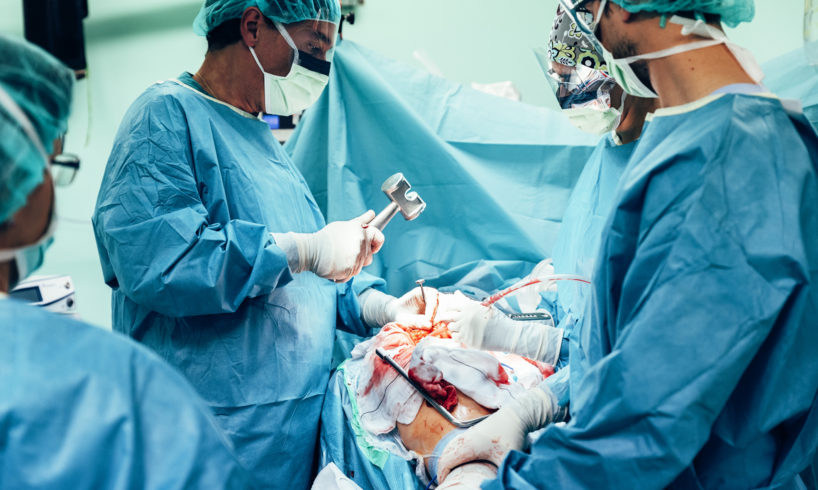
394 Views
Osteoporosis is a condition in which your bones become thin and porous, due to which they become prone to fractures. A little blow or a mild injury can cause your bones to break. Most commonly, the spine, hip, and wrist are affected due to it.
The chances of getting osteoporosis in women with increasing age are much greater as compared to men because of menopause. When they reach around the fifties, their estrogen levels drop sharply, making them prone to osteoporosis. Estrogen helps in maintaining bone health, along with regulating the menstrual cycle. If you feel bone pain and have reached fifty years of age, you must visit an orthopedic surgeon in Karachi.
You must consult with a healthcare provider in the earliest stages of the disease, as it can help in the prevention of its severe adverse effects.
What are the signs and symptoms of osteoporosis?
The signs and symptoms of osteoporosis include:
A decrease in height
It is one of the most noticeable symptoms of osteoporosis. The person may lose inches off their height due to compression fractures in the spine.
Recurrent fractures
A minor fall or movement can result in fractures due to osteoporosis. Your bones may become such thin and fragile that a sneeze or cough can result in a fracture.
Pain in back and neck
Generally, fracture of any bone is painful. But fractures of the spine can cause nerve compression, which makes it so painful to bear.
Kyphosis
Kyphosis is a stooped posture that occurs due to compression on vertebras. It can cause severe pain and may affect breathing as well by exerting pressure on airways.
What are the risk factors of osteoporosis?
The causes or risk factors of osteoporosis can be:
- Overactive thyroid gland
- Overactive parathyroid gland
- Long term use of corticosteroids like prednisolone
- Chronic lungs disease
- Cancer (especially multiple myeloma)
- Endometriosis
- Calcium deficiency
- Vitamin D deficiency
- Low intake of protein in the diet
- Inactive lifestyle
- Long term use of antacids containing aluminum
- Smoking
- Drinking alcohol
- Diet low in potassium
- Low levels of estrogen in women
How can you prevent osteoporosis?
The following measures may help in the prevention of osteoporosis.
Adequate intake of calcium and vitamin D
Since deficiency of both calcium and vitamin D make you prone to osteoporosis, you must keep their adequate intake in your diet. Eat foods like yogurt, fish, egg yolks, mushrooms, vegetables, and fruits to get the optimal amount of calcium and vitamin D.
Women of 50years of age should consume 1000mg of calcium, and 600 IU of vitamin D. While women above 50 should have 1200mg of calcium and 800 IU of vitamin D. If you do not meet these recommendations, then take a supplement. But make sure you do not overconsume it.
Meet the needs of potassium and protein in your diet
According to research, a lack of potassium in the diet can also lead to osteoporosis. You can get enough intake of it through oranges, dates, bananas, and potatoes. Also, protein plays a major role in maintaining bone health. Therefore, drink two glasses of skimmed milk daily and eat foods like eggs, chicken, red meat, and lentils.
Keep yourself moving
When you exercise, your bones remain healthy and strong because it stimulates their remodeling. You do not need to hit the gym. Walk for 20 to 30 minutes may also help in preventing osteoporosis.
Quit smoking and cut down caffeine intake
Smoking and caffeinated beverages like tea and coffee can reduce your bone density. Do not consume caffeine in high amounts, and quit smoking today.
How to cope with osteoporosis?
Living with osteoporosis can be difficult at times. But make sure that you keep yourself moving, practice relaxing exercises like yoga and meditation, hang out with your friends and family, seek counseling sessions, and maintain your balance.
Once it occurs, you can not get rid of it completely. Therefore, you have to learn how to live with it. If you are suffering from depression due to it, visit a psychologist, they can help you in coping up with the situation. Moreover, make a routine of exercise by consulting a physiotherapist.
Conclusion
Osteoporosis is a condition in which your bones become thin, brittle, and fragile, which makes it prone to fractures. Therefore you need to take extra care of yourself. For consultations regarding osteoporosis and fractures, visit an orthopedic surgeon in Lahore.
